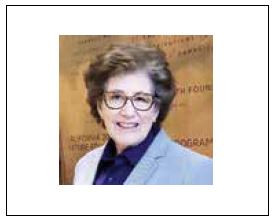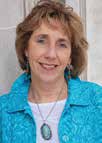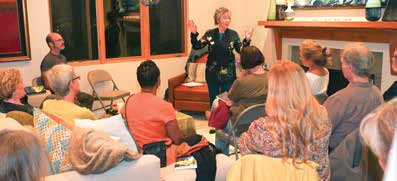
By Dr. Marcy Adelman–
An email announcing a poetry writing workshop from the UCSF MERI (Making Education Relevant and Integrated) Center caught my eye. Intrigued, I reached out to the Center for the San Francisco Bay Times to find out more about the workshop and the work of MERI.
The poetry workshop, in which participants both listen to and write poems, is a new program initiated by Redwing Keyssar, RN, the Center’s Director of Patient and Caregiver Education. Two different sessions are offered online weekly. One is called “Loss, Losing and Loosening” and is specifically for people dealing with issues of grief and loss. The other is called “Food for Thought” and is focused more on resilience in general.
MERI provides palliative care support and education for clinicians, staff at UCSF, and for the community at large. I asked Keyssar to describe palliative care and how she came to work in this area. She told me for the Bay Times, “Palliative care is a type of care that focuses on relieving the symptoms and stress of any serious illness or loss. The goal of palliative care is to improve quality of life. Many people, unfortunately, think that palliative care is the same as hospice, and is only for those at the end of life. That is not the case. Palliative care can be utilized at any time during the continuum of a serious illness. Hospice typically provides palliative care during the last six months of life, but other palliative care teams can provide support for many years.”

She continued: “When I became a nurse 30 years ago, I saw myself as a ‘midwife to the dying’ in order to support and witness people, and their loved ones, at the end of life. Early in my nursing career, I chose to work with people with serious illness—in oncology and critical care. As my professional life evolved, I began working more exclusively in palliative care, which addresses suffering long before the end of life. When you have a serious illness, it affects everything in your life. This work is about reducing a person’s suffering and improving their quality of life. It includes the wellbeing of the whole person. When you address the psychological, physical, and spiritual suffering that people are experiencing, people do better.”
I then asked how she decided to include a poetry workshop in her program.
“To me, poetry is a path of healing and another way to relieve suffering,” she said. “Poetry has always been an import part of my life. Several years ago, I studied with John Fox, a poet and founder of the Institute for Poetic Medicine. He guides people to use poetry as a modality of change, as a healing modality. Poetry touches more than just the intellectual part of the brain. It is a way to access emotions and express in words things we cannot express in any other way.”

“This year I had hoped to set up Poetry Cafés as in-person groups,” she added. “But once COVID became a reality, we went virtual. We started with one group for one hour once a week. Because we are virtual, our participant base expanded. We quickly realized we needed to offer more than one group. We have group members from all over the world. The response has been surprising and gratifying. Through the Art for Recovery program in the UCSF Cancer Center, there has been a request for an LGBT specific group as well as a group to focus on end-of-life issues through poem-making.”
Those groups are set to start soon, as of this writing.
At the beginning of each session, Keyssar reads a poem and asks the group members to respond by simply stating what resonates for them. Then a prompt is offered and people create their own poems and, if willing, read them out loud. She asks them to write about what resonates for them and what touches their heart. This is all done in a 5-minute writing session.
“The poems that come through people are remarkable,” she said. “We don’t need to know the specifics of a person’s loss. We are just there to hear and acknowledge and support the feelings that come through their poetry.”
Keyssar shared that “one gay man who recently lost his partner of 35 years told me he hadn’t written a poem since he was in grade school. Writing poems in the workshop enabled him to outwardly express his sadness, his deep grief and missing of his partner, and also helped him see his own strengths and abilities to accept the impermanence of this life. His healing process has been transformational.”
He told Keyssar that when people ask him, “How are you able to do so well in your grief?” he replies, “By writing poems.”
She concluded, “We now have a waiting list for this winter’s groups. We are looking into a train the trainer program so that other people and organizations could use this format as a healing modality as well. Clearly there is a greater need than we can provide ourselves, but we at the MERI Center are so grateful and honored to be part of this poem-making community that has been able to offer some hope and sustenance in these ever-so-difficult times.”
For more information: https://MERI.ucsf.edu
Dr. Marcy Adelman, a psychologist and LGBTQ+ longevity advocate and policy adviser, oversees the Aging in Community column. She serves on the California Commission on Aging, the Governor’s Alzheimer’s Prevention and Preparedness Task Force, the Board of the Alzheimer’s Association of Northern California, and the San Francisco Dignity Fund Oversight and Advisory Committee. She is the Co-Founder of Openhouse, the only San Francisco nonprofit exclusively focused on the health and well-being of LGBTQ+ older adults.
Published on January 14, 2021
Recent Comments